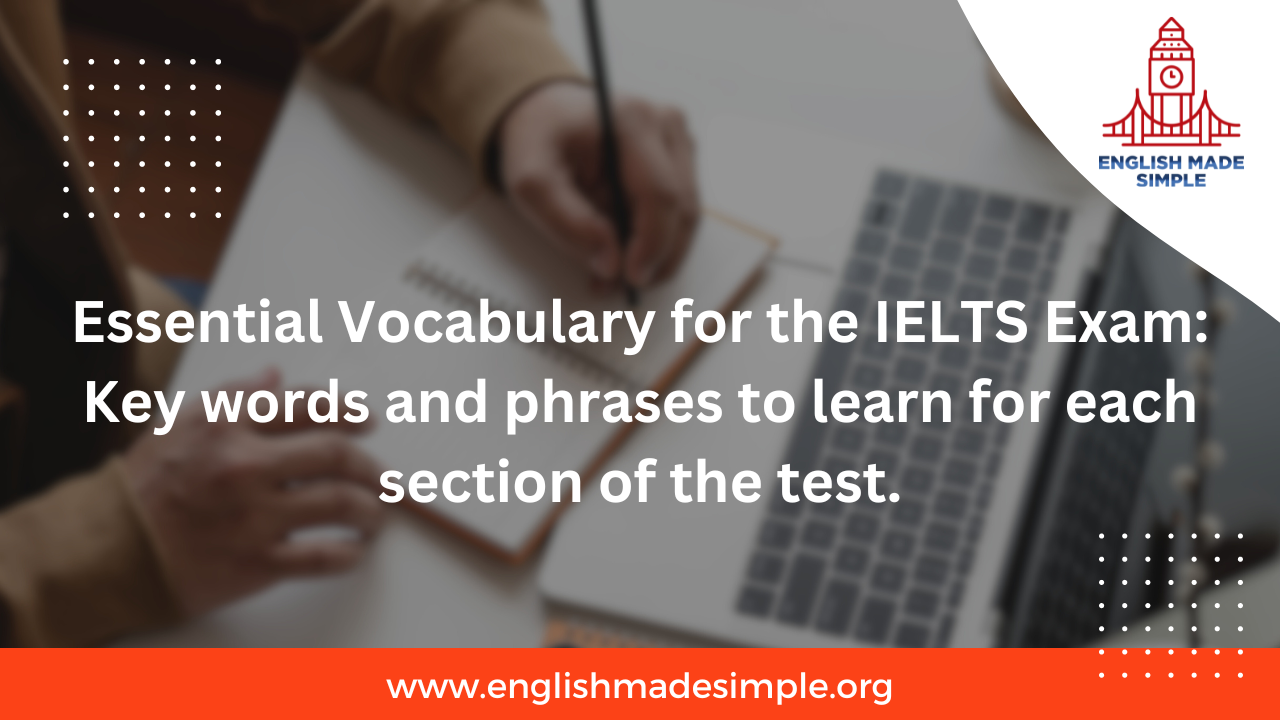
Essential Vocabulary for the IELTS Exam: Key Words and Phrases to Learn for Each Section
A robust vocabulary is crucial for achieving a high score on the IELTS exam. Whether it’s for understanding reading passages, answering listening questions, constructing well-argued essays, or articulating thoughts in the speaking test, knowing the right words can make a significant difference. This blog provides essential vocabulary for each section of the IELTS exam.
Listening Section
Common Topics and Related Vocabulary:
Education:
- Words: curriculum, syllabus, lecture, seminar, tutorial, assessment, grade, qualification.
- Phrases: “take notes,” “pass an exam,” “attend a lecture.”
Workplace:
- Words: employment, occupation, profession, career, salary, wages, benefits, promotion.
- Phrases: “apply for a job,” “work overtime,” “get a raise.”
Health:
- Words: nutrition, diet, exercise, wellness, diagnosis, treatment, prevention, symptoms.
- Phrases: “consult a doctor,” “take medication,” “maintain a healthy lifestyle.”
Environment:
- Words: sustainability, conservation, pollution, ecosystem, biodiversity, climate change, renewable energy.
- Phrases: “reduce carbon footprint,” “protect natural habitats,” “combat global warming.”
Reading Section
Academic Reading:
Science and Technology:
- Words: hypothesis, experiment, innovation, research, development, breakthrough, theory.
- Phrases: “conduct an experiment,” “analyze data,” “prove a theory.”
Social Sciences:
- Words: sociology, anthropology, psychology, economics, politics, culture, society.
- Phrases: “study human behavior,” “analyze social trends,” “conduct a survey.”
Humanities:
- Words: literature, philosophy, history, art, ethics, religion, mythology.
- Phrases: “interpret a text,” “study historical events,” “analyze artistic techniques.”
General Training Reading:
Daily Life:
- Words: routine, chores, shopping, cooking, maintenance, leisure, hobbies.
- Phrases: “run errands,” “prepare a meal,” “spend leisure time.”
Travel:
- Words: destination, itinerary, accommodation, transportation, sightseeing, tour, booking.
- Phrases: “make a reservation,” “plan an itinerary,” “explore tourist attractions.”
Business:
- Words: finance, marketing, management, entrepreneurship, investment, profit, strategy.
- Phrases: “start a business,” “develop a marketing plan,” “analyze financial statements.”
Writing Section
Academic Writing:
Task 1 (Graphs, Charts, Tables):
- Words: increase, decrease, fluctuate, peak, decline, stable, trend.
- Phrases: “the graph shows,” “there was a significant increase,” “the trend indicates.”
Task 2 (Essays):
- Words: argument, perspective, evidence, analysis, conclusion, counterargument, support.
- Phrases: “on the one hand,” “on the other hand,” “it can be argued that,” “in conclusion.”
General Training Writing:
Task 1 (Letters):
- Words: formal, informal, complaint, request, inquiry, gratitude, suggestion.
- Phrases: “I am writing to inform,” “I would like to request,” “I am grateful for.”
Task 2 (Essays):
- Words: opinion, problem, solution, advantage, disadvantage, cause, effect.
- Phrases: “in my opinion,” “the main issue is,” “a possible solution could be.”
Speaking Section
Part 1 (Introduction and Interview):
Personal Information:
- Words: family, hobbies, interests, background, education, occupation.
- Phrases: “I come from,” “I enjoy,” “I work as.”
Daily Activities:
- Words: routine, schedule, leisure, chores, tasks, responsibilities.
- Phrases: “on a typical day,” “I usually,” “I spend my free time.”
Part 2 (Long Turn):
Describing Events and Experiences:
- Words: memorable, significant, challenging, enjoyable, experience, event.
- Phrases: “one of the most memorable experiences,” “I remember when,” “it was a significant event because.”
Describing People and Places:
- Words: personality, characteristics, appearance, atmosphere, location, surroundings.
- Phrases: “the person is known for,” “the place is famous for,” “it is located in.”
Part 3 (Discussion):
Opinions and Arguments:
- Words: viewpoint, perspective, agree, disagree, debate, discussion, issue.
- Phrases: “I believe that,” “it seems to me,” “on the contrary,” “one could argue.”
Abstract Ideas and Concepts:
- Words: ethics, philosophy, society, culture, innovation, development.
- Phrases: “the concept of,” “it is important to consider,” “from a broader perspective.”
Tips for Building IELTS Vocabulary
- Read Widely: Engage with a variety of texts, including newspapers, academic journals, books, and online articles.
- Use Flashcards: Create flashcards with new words and their meanings, and review them regularly.
- Practice Writing: Incorporate new vocabulary into your writing practice to reinforce understanding.
- Listen to English Media: Watch movies, listen to podcasts, and follow English-language news to hear new words in context.
- Engage in Conversations: Practice speaking with native speakers or fellow learners to use new vocabulary in conversation.
- Use Vocabulary Apps: Utilize apps designed to build and test your vocabulary knowledge.
Conclusion
Building a strong vocabulary is essential for success on the IELTS exam. By familiarizing yourself with key words and phrases for each section, you can improve your comprehension and expression, ultimately achieving a higher score. Remember, consistent practice and exposure to a wide range of topics will help you develop a more extensive and useful vocabulary.
